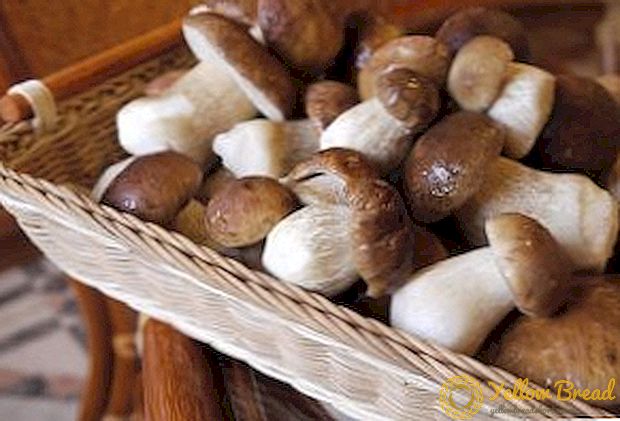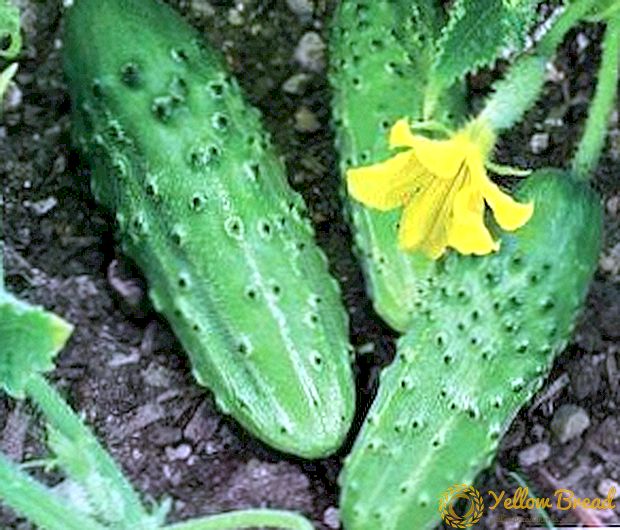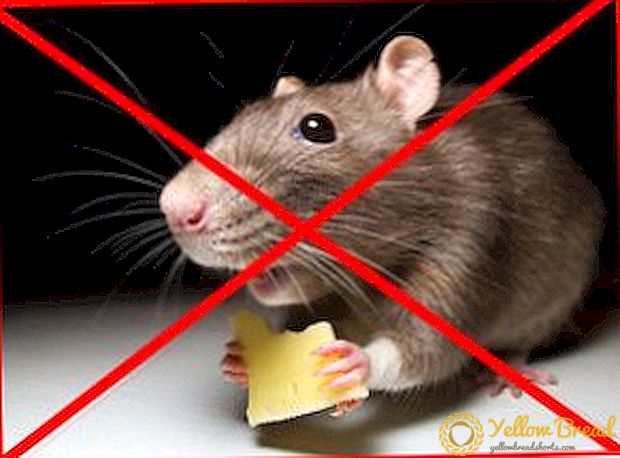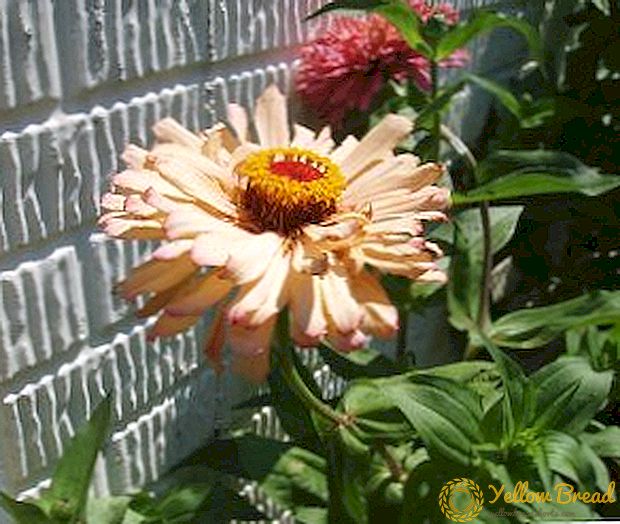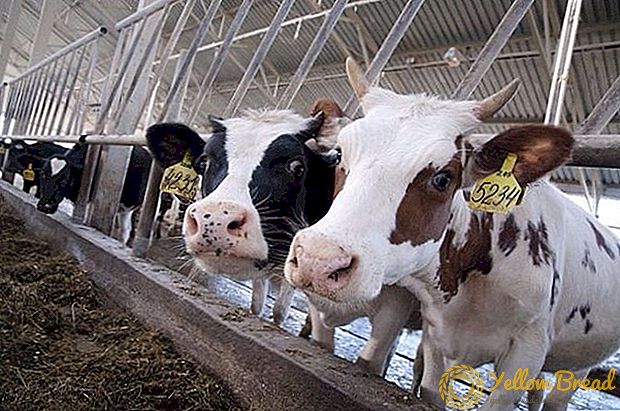
Poultry can not be considered only a hobby, because it can be quite profitable business.
The most important advantage of breeding any kind of poultry is their wastelessness.
After all, not only meat and eggs are beneficial, but also their fluff, big money can be earned by selling young stock.
Today we want to find out in more detail how easy or difficult it is to breed domestic ducks, since this bird can produce not only excellent taste, meat, but also excellent liver.
We will focus on the necessary conditions for keeping these birds, feeding them, getting young offspring, its further rearing and caring for them.
Domestic ducks - how useful is this bird? Understand the pros and cons of breeding
Of course, no matter how simple the breeding of poultry may seem, there are still a number of conditions and responsibilities that the poultry farmer must comply with.
For a start, let's look into what the advantages and disadvantages of the process of growing domestic ducks. Therefore, let us turn to the experience of poultry farmers who have long been breeding ducks and know a lot about this business.
The advantages of domestic ducks and the advantages of their breeding
If you first prepare all the necessary conditions for these birds - they will bestow you with a very large number of their products. Virtually all duck breeds are very good gaining live weightwhile not requiring abundant feeding - most of their diet they are able to extract independently (especially if there is a reservoir in the vicinity).
Duck meat has a variety of merits:

- a special delicate taste, unlike any other species, is superior in quality even to curtain;
- a large number of trace elements that are easily absorbed by the human body;
- meat of modern breeds contains a very low percentage of fat, making it a dietary one;
- one individual meat breed can produce about 2.5 kilograms of a good product.
Also, do not forget about the existence of special breeds of ducks, which are grown exclusively for obtaining high-quality liver, used to prepare the well-known delicacy of foie gras. At the same time, the weight of the liver of one adult duck can reach 0.5 kilogram.
Entrepreneurial poultry farmers sell it in popular restaurants, earning big money.You can also implement duck eggs, which in the household also have a weighty value: they are large, very high-calorie, with a hard shell. However, many do not like their not quite familiar smell, although on the whole it is easy to get used to it.
Among the others merits Breeding ducks at home should be called:
- Ducks are almost omnivorous, eat and digest food of plant and animal origin without any problems. With water content, these birds also assume the role of natural water filters.
- They belong to one of the most productive and early ripening bird species.
- Of great importance is not only the direct production in the form of duck meat, eggs and fluff, but also the droppings of these birds. He is one of the best fertilizer for garden beds.
- The ducks are clean, they do not stain their feathers and down, which allows it to be realized.
- Ducks can even be grown in cages, which rather saves space, mechanizes the processes of feeding food and water, and collecting eggs. In the cells it is much easier to maintain the sanitary environment.
Cons that accompany duck breeding

Although we above and attributed the cellular method of keeping ducks to the benefits, but it affects the productivity negatively. After all, the best way to breed these birds is to have natural walking with ponds.
Without compliance with such conditions, meat breeds can begin to lay off large amounts of fat, which also affects the quality of their egg-laying.
It is believed that the cellular content affects the quality of duck meat. In terms of nutrition, you will also have to fully comply with such requirements as quality, nutrition and freshness.
With the maintenance of a large number of ducks, you will have to forget about the aesthetics of your reservoir (especially if it is a small artificial pond). Birds will trample the entire shore, a rather large amount of litter can accumulate nearby. Also, a lot of down and feathers will float on the surface of the reservoir.
We are building a convenient poultry house for keeping ducks
The room for ducks does not need to be built very large. Firstly, the birds themselves do not require it, and secondly - the smaller the room, the easier it is to heat or warm during the winter period of time.
An important role in this is played by the fact that ducks are exclusively "down to earth" way of life, they do not need high perches or special climbing poles, like chickens or turkeys.
In this regard, it is quite enough to build a house with a front wall of 1.8 meters, and the rear just 1 meter. And the density of placement of ducks per 1m2 can be quite high. On such an area will be enough space for 3 individuals.
It is very important that during the cold season there is a lot of litter in the room. She is not only able to warm the house, but helps the birds to hide and keep warm, to build a nest for themselves. One adult duck litter should be approximately 6 kilograms.
You can use hay or straw. When the outside becomes completely warm, it is better to clean the litter altogether: the birds will sweat from the heat in the summer, the dry grass will absorb moisture (sweat), damp will develop in the house, and after it various diseases.
Features of the microclimate required for ducks and their offspring

- Requirements for temperature conditions. Adult ducks are able to tolerate cold temperatures rather firmly, but not frosty ones. Therefore, the temperature in the house should not be allowed to fall lower than 0 ° C.
During the laying of ducks, it is optimal to maintain the temperature at 18–20 ° C, which will have a very favorable effect on their similar activity. When keeping small ducklings that just hatched from eggs, the temperature should be maintained at between 29-32 ºС.
Every week it gradually decreases to 20 ºС acceptable for adults.
Determine the need to increase the temperature by the behavior of birds. If they begin to constantly lump together, eat less, lose weight - this means that they are freezing. In this case, be sure to insulate the house by any means.
With very high heat, birds will have rapid breathing, they will walk with their wings spread, they will drink a lot. In this case, it will be necessary to improve the ventilation.
- The required level of humidity in the house. Humidity ducks tolerate very problematic, although they belong to water birds. It is better that it does not exceed the figure of 65-70%.
Too high humidity has a bad effect on how birds gain weight, they can also start to fall feathers. With very high humidity, duck immunity is greatly reduced.We must not allow very sharp drops in the described indicator, ducks are very sensitive to this.
- Ventilation is one of the main aspects of breeding ducks. It is very important to make the house so that in the late autumn and early spring fresh air can always enter the room and the dirty one go outside.
In winter, artificial ventilation with warm air flows will be needed. And in hot weather, birds will always be on walks or in aviaries, so they will have enough fresh air.
- Artificial and natural lighting house. Natural lighting should not be too abundant, since for this it is necessary to make large windows - the direct sources of cold. But if you want your birds to lay eggs better and longer - it is very important to carry out artificial lighting in the house.
In particular, with the help of it, it will be necessary to extend the light day in winter, keeping it up to 12 hours (additionally including in the morning and evening). Starting to turn on the light is from the end of December-beginning of January, which will stimulate the loss of feathers in birds and improve the process of accumulation of body weight.
In the springtime, abundant artificial illumination well stimulates the sexual activity of the drakes, so the light day is prolonged by 2-3 hours.
We organize the optimal space for walking ducks: what to do if there is no body of water?

The best option for keeping ducks, and the best for both the birds themselves and their owners are free runs close to natural water. For birds, this is good in that they are able to access virtually natural habitats.
The reservoir will provide them with the right food - weeding, various bugs and small fish. Also, in the water, these birds just love to cool on very hot days. The advantage of this kind of maintenance is noted by the fact that such conditions stimulate very rapid growth of young animals and their entry into puberty.
Adults also gain a lot of weight, and even ducks are not obese, as they get the opportunity to move a lot.
Why are walking near water bodies beneficial for poultry farmers? Yes, if only because in the summertime the birds will not have to build special pens and bother with the facthow to provide them with the necessary amount of clean water and food.
By the way, the feed also turns out very well to save - almost 5 times. With natural walking, the birds themselves choose the necessary ration, which is very well reflected in the processes of digestion. Also, in this case, the birds will not have to build special sheds, under which they could hide from the hot sun.
Your only task is to release them in the morning from the house and drive them to the pond, and in the evening give some food and close them back to the house.
If you have a small yard and no reservoirs, then all the necessary conditions will have to be created artificially. The most important thing is to build something like a pool or a small pond that could be constantly cleaned and replenished with fresh water.
The pen itself should be large enough so that the birds can walk freely without interfering with each other. Ideally, the corral will be located right near the exit of their house.
Duck diet: what food is best to give to achieve rapid growth of birds?
Ducks are best suited combined type of diet, when it combines not only feed, but also greens, wet mash, mineral components. This makes the food balanced, has a positive effect on the digestive process of birds.
Directly in the feed can include:

- Various grains - wheat, corn or barley (or all in turn).
- Wheat bran.
- Meal of soy or sunflower origin.
- Peas (porridge from peas).
- Bone, feather, fish and bone and bone meal.
- Inedible fat.
- Powdered milk.
- Seashells, soldered salt and premixes.
What feeders should be installed for birds?
Duck feeders can be installed directly on the floor, as they are a type of bird with very low legs. In this case, it will be very convenient to eat. However, so that the ducks do not scatter food around, one at a time in the trough do not fall asleep a lot of food, and exactly as much as the pack will be able to eat at one time.
Also, among all the birds, there are often one or two individuals who like to climb into the trough with their feet, trapping food and not giving other relatives food to eat.Therefore, over the feeder, it is important to do something similar to a pen that would prevent the ducks from getting inside.
Requirements for drinking bowls for ducks
The role of drinking water for these birds can also be carried out by the reservoir, but they must also be installed in the premises for housing.
It is best to choose wooden, with rather narrow walls. Ideally, if the water in them will flow, that is, constantly fresh. For small ducklings convenient to install vacuum drinkers.
Young offspring of ducks obtained through incubators and through hen

Ducks without problems can be bred and naturally by means of hens, and using the incubator.
Both of these methods are quite effective, however, when using the incubator, the ducklings will not have a mother and will have to be followed very carefully and looked after.
But the incubator is that it allows you to get the largest possible number of offspring.
After all, when a duck incubates eggs, hatchability of young stock will depend solely on the manifestation of its maternal instinct.
Also, the more brood of ducklings you want to get, the greater the number of chicks will have to be purchased.
How to grow duck young: feeding and conditions in the first month after birth
Only born ducklings are fed boiled and mashed egg. On the third day, it is allowed to add cottage cheese to it, another day later various boiled cereals. From the fourth day you can add greens and meat waste to the mixture.
In the second decade, ducklings can already be given boiled potatoes, but it will also have to be ground. It is best to provide ducklings with wet mash, which will be easier for them not only to swallow, but also to digest.
Small ducklings from the very beginning need to be taught to eat food. This problem is especially acute when young offspring are born using an incubator. To do this, the food should be brought directly to the beak so that the duckling will capture a little and feel its taste.
It is very important that the room for keeping ducklings is as spacious as possible. After all, if they are very much crowded, the strongest will take food from the weaker, thus slowing down their development even more.
They can be let out on their runs on the fourth day of life.However, be careful that the ducklings are not stuck anywhere, not lost and do not fall into the teeth of a dog or cat. Gradually accustom them to water.
How to care for ducks to prevent obesity and the occurrence of diseases

- Be attentive to the diet of your pets, try to make it as diverse and nutritious as possible. Add minerals to it regularly.
- Provide the birds with the greatest possible space for walking. It is also necessary to observe this rule in winter, because at this time birds are especially prone to obesity.
- Duck behavior is the most important symptom of the onset of disease. Therefore, if you notice lethargy for the birds, or, on the contrary, incomprehensible activity, immediately inspect the individual carefully, protect them from possible interaction with the flock and proceed to treatment.
- In order for the eggs to be fertilized, be sure to keep several ducks in the flock of ducks.
- Be attentive to the characteristics of the breed that you breed. After all, those recommendations that may be mandatory for some ducks may be totally unacceptable to others.

